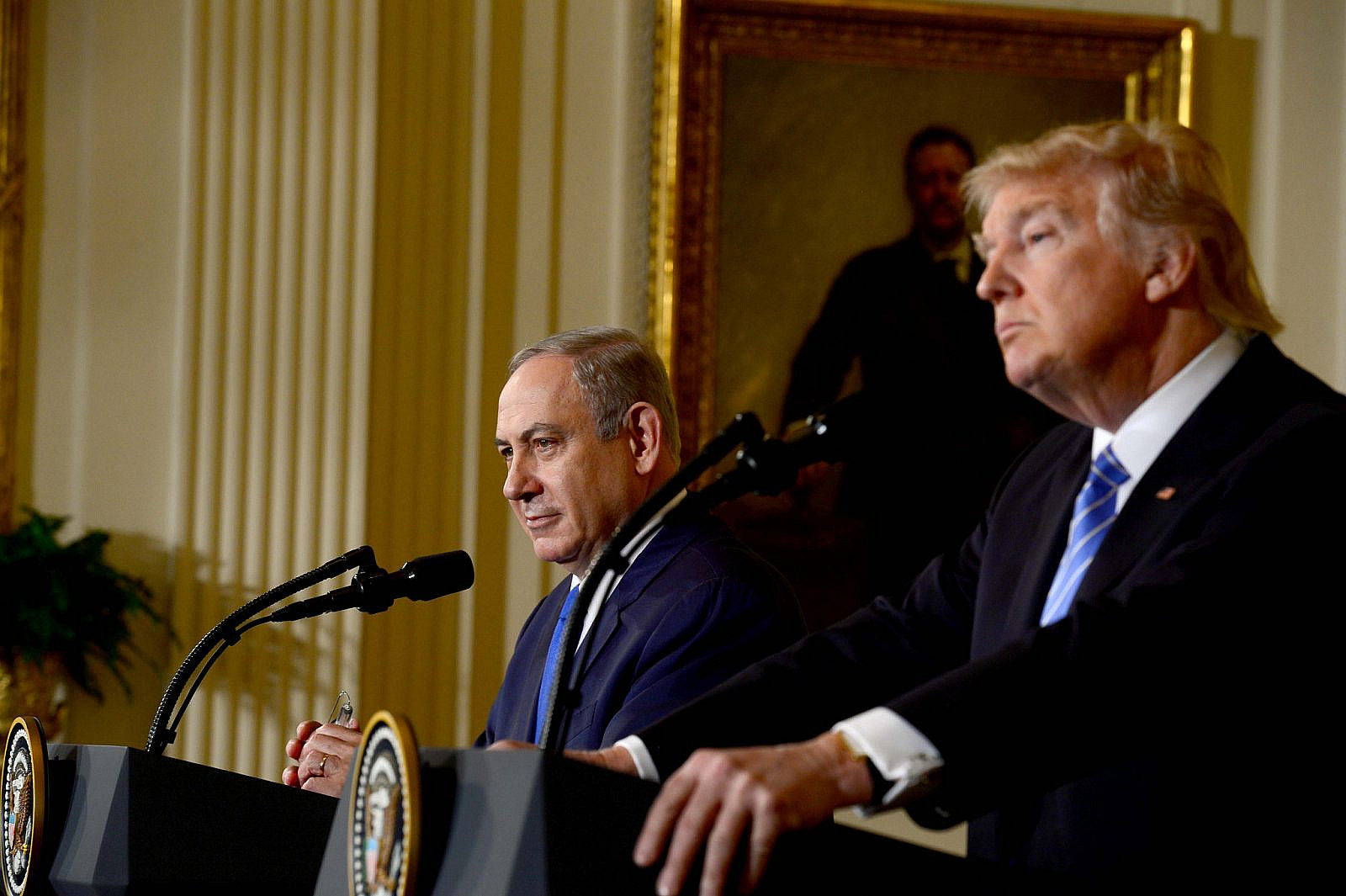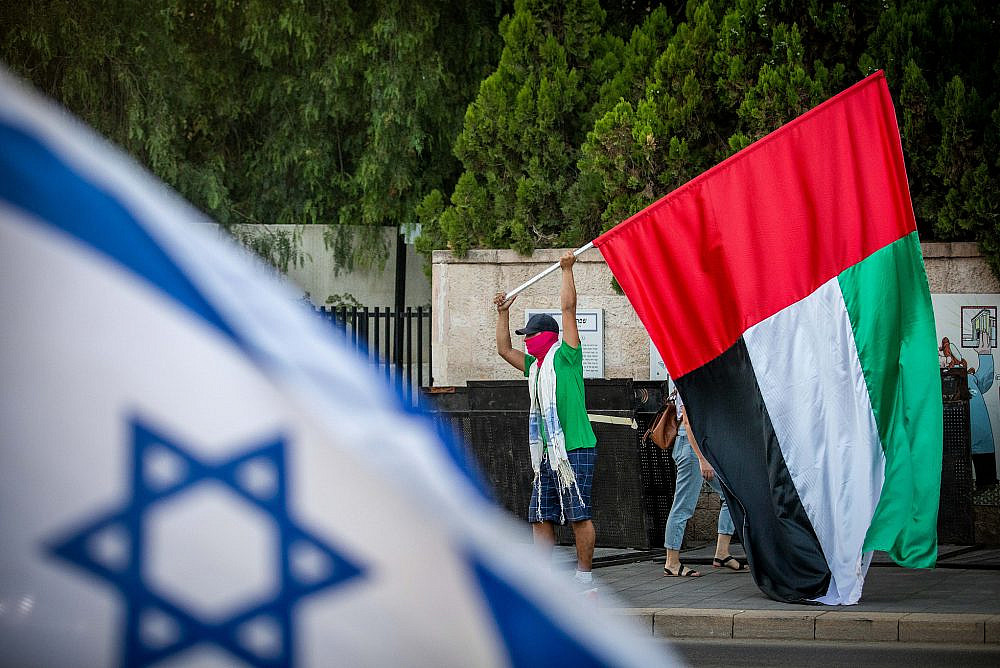Something quite unique happened in the Knesset on Oct. 15. The much-lauded agreement between Israel and the United Arab Emirates was presented before the parliament for a vote, a few weeks after Prime Minister Benjamin Netanyahu signed them on the White House lawn. An overwhelming majority of 80 Knesset members ratified the agreement — from the liberal Zionist Meretz party, to Netanyahu’s right-wing Likud, to Naftali Bennett’s nationalist-religious Yamina. Only 13 of the Knesset’s 120 members voted against the deal: all of them were members of the Joint List, the alliance of four parties largely representing Palestinian citizens of Israel.
How did we reach the point where the most pro-peace party opposes such deals with Arab countries, while the Jewish-Israeli right supports them? The answer, in short, is that these deals — including the later ones with Bahrain and Sudan — are not truly peace agreements: they are tools of oppression.
Peace, as even the Oxford Dictionary stipulates, requires a preexisting state of war or hostilities. Yet not a single Israeli soldier has ever been killed in battles with Emiratis, and residents of Manama never had to fear an Israeli airstrike. In fact, Israel has for years fostered warm strategic and business ties with Gulf countries, which included Israeli companies offering the UAE and Bahrain (among others) advanced spyware to be used against their own citizens.
Instead, from the Israeli right’s perspective, the main purpose of these agreements is to solidify its power and to further weaken the Palestinian struggle against occupation and apartheid. As a bonus, these agreements invite some positive coverage to the otherwise deeply unpopular administrations of both Netanyahu and Trump — both of whom are failing to handle the coronavirus pandemic and its economic repercussions, and who are facing legal consequences and public pressure over their corruption.
Pressuring Palestinians to cave in
For his part, Netanyahu is extremely straightforward about the link between his normalization agenda and Israel’s occupation. “The Palestinians say we should retreat to the ‘67 borders and divide Jerusalem, which is absurd,” he told Israeli Army Radio in August, after the Abraham Accords were announced. “I presumed that we should approach an entirely different concept: peace in exchange for peace, peace out of strength.”
For the prime minister, whose opposition to a Palestinian state is well known, the accords are proof that the “land for peace” formula that defined previous peace efforts were a mistake. “We have broken this terrible and dangerous doctrine, and I am proud of it,” he said.
Put more bluntly, the key goal of these new alliances is to pressure Palestinians into caving on their central political demands — demands that are rooted in international law and UN resolutions. As far as the Israeli government is concerned, Palestinians, like the UAE, Bahrain, and Sudan, should settle for “peace for peace” — with no territories handed over, nor a share of Jerusalem, nor an end to military rule, nor repatriation for refugees.

For decades, one of the Palestinians’ main strengths at the negotiating table has been the backing of Arab states. A bargaining chip was set by the 2002 Arab Peace Initiative, ratified by the Arab League several times since, which promised full and official normalization with Israel in exchange for its ending of the occupation. In Netanyahu’s view, this consensus meant that Palestinians were holding Arab countries “hostage to the most extreme demands.” By slowly chipping away at that united front one country at a time, Netanyahu and Trump are taking away yet another form of Palestinian leverage — one of their last.
The more dovish selling point for these accords, as presented by Bahraini leaders and Israeli Zionist leftists like Meretz Chair Nitzan Horovitz, is that they have fended off Netanyahu’s plans for unilateral, de jure annexation of parts of the West Bank. Yet formal annexation was dead in the water even before the accords were announced, due to both international pressure as well as opposition within the settler right and Netanyahu’s coalition government. Meanwhile, de facto annexation — boosted by Trump’s “Deal of the Century” — is continuing on the ground across the West Bank at full speed: on the lands of Battir near Bethlehem, through new settlement outposts and roads, in East Jerusalem where the Jewish National Fund is allying with settler groups to deepen Jewish control of the city, and more.
Any hopes that the deals with Gulf countries would slow down annexation were soundly erased this month, when Netanyahu announced a new wave of settlement construction, which went unopposed by the UAE and Bahrain. As a senior Emirati official expressed to Israeli news site Ynet, Israel can expect “a warm peace, which can even withstand a crisis like a war in Gaza.”
Thus, not only do the accords do nothing to promote the end of the occupation of Palestinians — they actively cement it. As the Balad party chair Jamal Zahalka recently put it prior to the announcement of the normalization deal with Sudan, the Abraham Accords are essentially an alliance of three apartheid states: Israel with its apartheid against Palestinians; Bahrain and its Saudi-backed Sunni oppression of the Shia majority; and the UAE, where a million Emirati citizens live with eight million “foreigners” with no rights.
Putting the Zionist left on the spot
This brings us back to the rupture within the Jewish-Israeli left, whose fault lines can roughly be drawn around its relationship with Zionism. While anti- or non-Zionist Jewish leftists support the Joint List’s position against the agreements, Labor and Meretz are voting and speaking out in favor of them.
The latter’s position is echoed on the pages of Haaretz, Israel’s main liberal Zionist newspaper, which in a recent editorial hailed the accords as “an extremely important event in the history of the Israeli-Arab conflict… Netanyahu is entitled to reap the credit for this breakthrough, and Israel owes U.S. President Donald Trump its thanks for his efforts and the pressure he exerted, without which this ceremony wouldn’t be taking place.” For Meretz and Haaretz, the accords are not a hurdle or detour, but a stepping stone toward peace with the Palestinians.

This position, unsurprisingly, completely ignores the voices of Palestinians themselves — from activists to analysts to politicians, from inside Israel to the occupied territories to the diaspora — who have stressed that the agreements are being used as a cloak to further entrench apartheid. What is abundantly clear to Palestinians and the Israeli right is somehow lost on liberal Zionists.
Given that Netanyahu’s gambit is being weaponized against the Israeli peace camp as well as the Palestinians, the Zionist left’s warm response to the accords may seem surprising. For years, the left has relied on two main arguments for peace with the Palestinians: to end violence and bloodshed, and to gain legitimacy and normalization with Arab countries.
Netanyahu has rendered both these incentives redundant. The number of Israeli casualties to the conflict has decreased tenfold over the past decade, reducing the occupation’s cost in human life. Now, with these “peace deals,” it is becoming apparent to Israelis that they do not even “need” the Palestinians to access the wider Middle East. All the while, Israel can continue profiting from the occupation, from “cheap” (read: stolen) land for housing, to water and other natural resources, to a captive market and labor force, and so on.
As with the case of the Boycott, Divestment, and Sanctions (BDS) Movement, the question of the Abraham Accords puts Jewish-Israeli leftists on the spot. True resistance to the colonial situation requires putting our privilege in check and, in this instance, resisting “peace agreements” that benefit Israelis only. Such a position, which opposes giving Israel “carrots” for its criminal actions and supports wielding “sticks” through international pressure, is a hard sell for the Israeli public, which explains why the Joint List is left so glaringly alone in its position. And yet, it is the only way to promote true peace, freedom, equality, and democracy in this land. We — Israelis on the ground, and allies of justice internationally — need only listen to our Palestinian partners to understand this.


